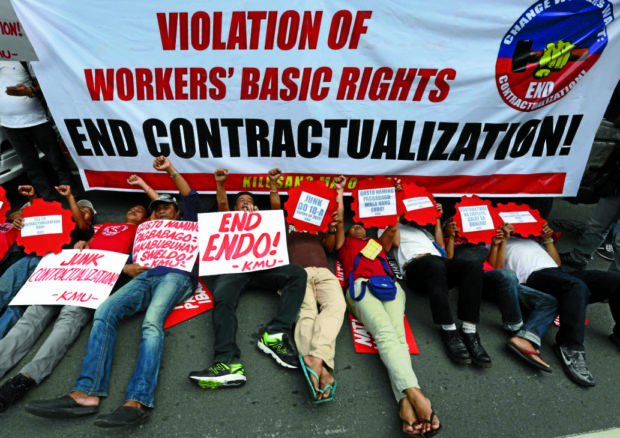
Labor activists call for a total ban on contractualization. INQUIRER/ MARIANNE BERMUDEZ
The House of Representatives has approved on third and final reading the measure seeking to institutionalize a “compressed work week scheme” where the weekly 48 normal work hours are spent on fewer days.
However, Gabriela Women’s Party, in a statement on Sunday, said the compressed work week scheme would reverse the labor movement’s historic victory for an eight-hour work schedule.
House Bill No. 6152, or “An Act Increasing the Normal Work Hours Per Day Under a Compressed Work Week Scheme,” was passed with 226 affirmative votes, with no dissents or abstentions.
If the bill becomes enacted, employers would be allowed to exceed the eight-hour daily normal working hours by adopting a scheme reducing the number of working days in a week.
Normal working hours would still have a limit of 48 hours a week, but employers would be allowed not to spread them out over six days.
Overtime work would be redefined as work done beyond the “number of hours under a compressed work week scheme.”
While employees have the right to a 24-hour weekly rest period in a six-day work week scheme, this would be extended to 48 to 72 hours for those working under a compressed work week scheme.
The measure seeks to amend Articles 83, 87 and 91 of the Labor Code of the Philippines.
It was introduced by Reps. Mark Go, Deogracias Victor Savellano, Eleanor Bulut-Begtang, Ma. Lourdes Agabao, Jesus Celeste, Christopher de Venecia, Rodolfo Fariñas, Ronald Cosalan, Napoleon Dy, Leopoldo Bataoil, Strike Revilla, Marlyn Primicias-Agabas, Luisa Lloren Cuaresma, Micaela Violago, Randolph Ting, Ariel Casilao, Teodoro Montoro, Leo Rafael Cueva, Edwin Ong, Vicente Veloso, Edcel Lagman, Peter Unabia, Yedda Marie Romualdez, Vilma Santos-Recto, and Julieta Cortuna.
Go explained in a statement: “These arrangements give employers and employees flexibility in fixing hours of work compatible with business requirements and the employees’ need for a balanced work-life.”
Gabriela Rep. Emmi de Jesus, a former labor organizer, said the scheme would result in “longer hours of work per day, increase incidence of Endo or contractualization, and will have downward implications on workers’ take-home pay.”
De Jesus feared this would allow companies to ease out regular workers in the informal economy by introducing more non-regular workers to take over the freed-up working days.
“This will mean drastically shifting work schedules for workers as companies try to shuffle in more contractual workers into the production cycle. In fact this is already being done in many manufacturing firms in economic zones,” she said.
De Jesus also disputed the argument that the scheme would help workers save in terms of transportation expenses, saying it would be “overcome by the general reduction in wages, allowances and benefits.” She also raised possible negative effects of a longer workday on workers’ health.
“But companies right now are far from the red zone and are reaping the gains of increased productivity despite stagnant wages. Why pursue a measure that is not applicable anymore and that which will only result in increased labor exploitation?” De Jesus ended. CBB